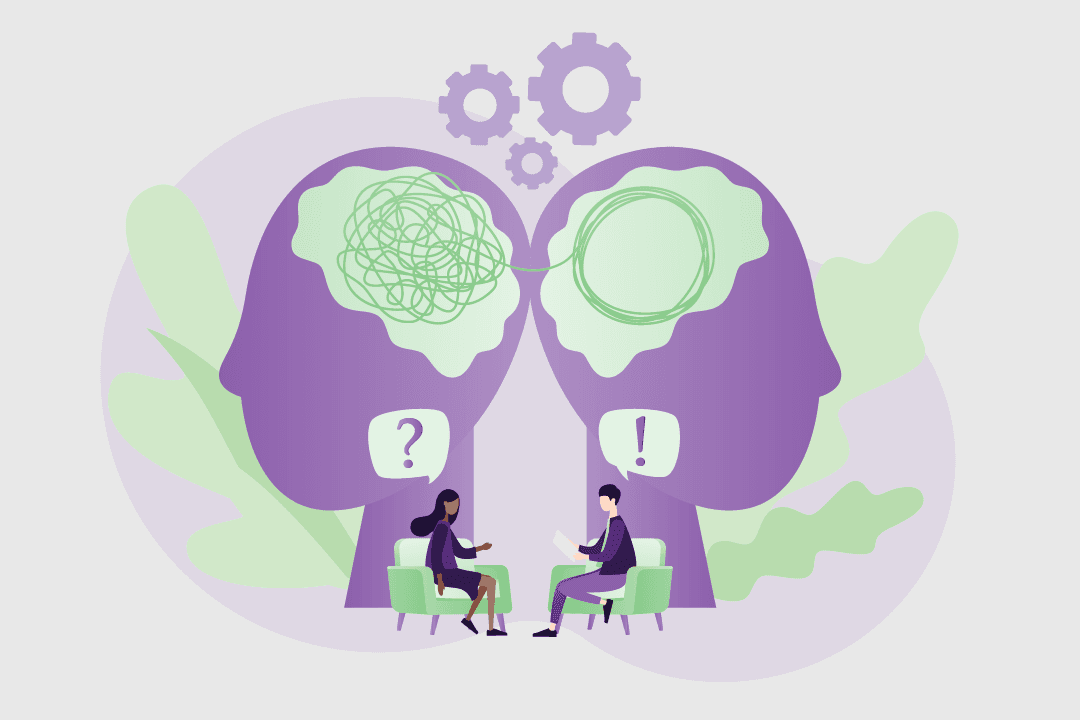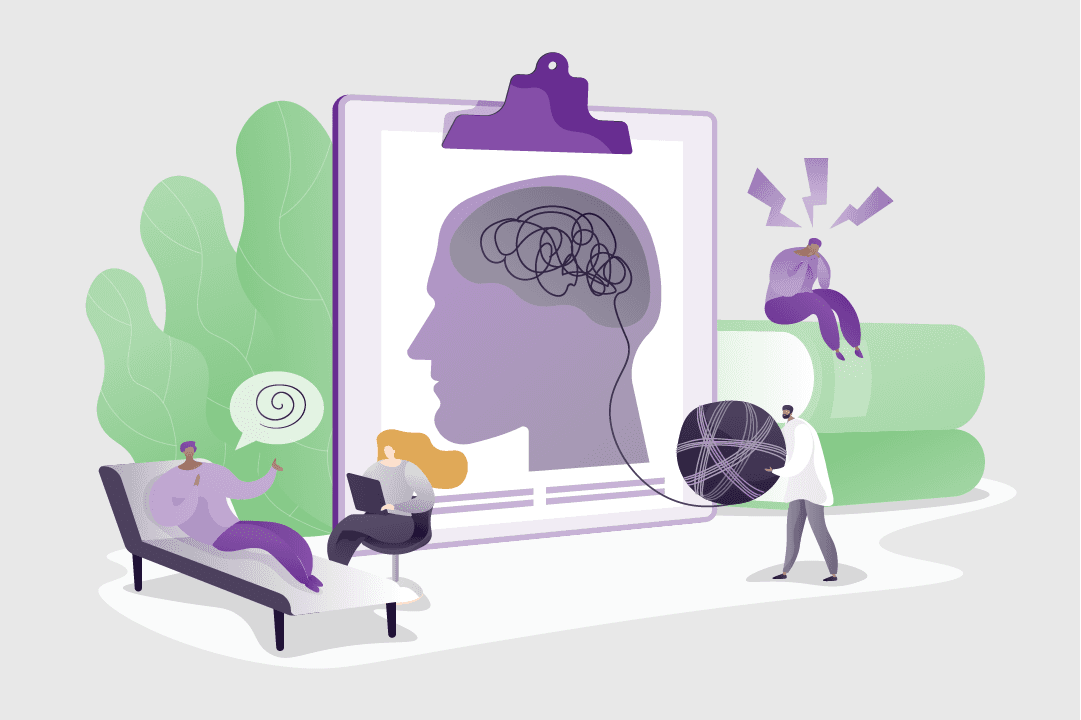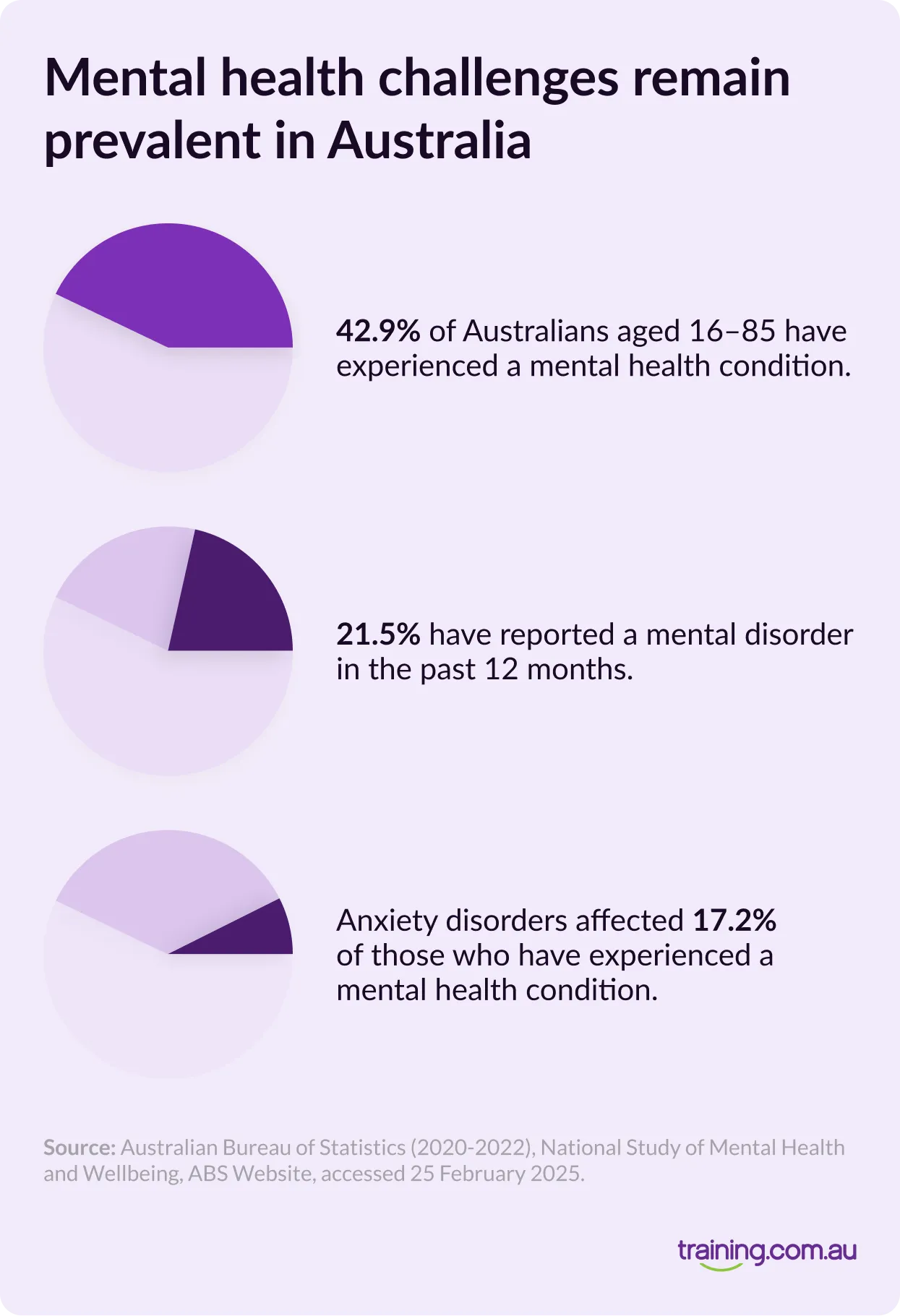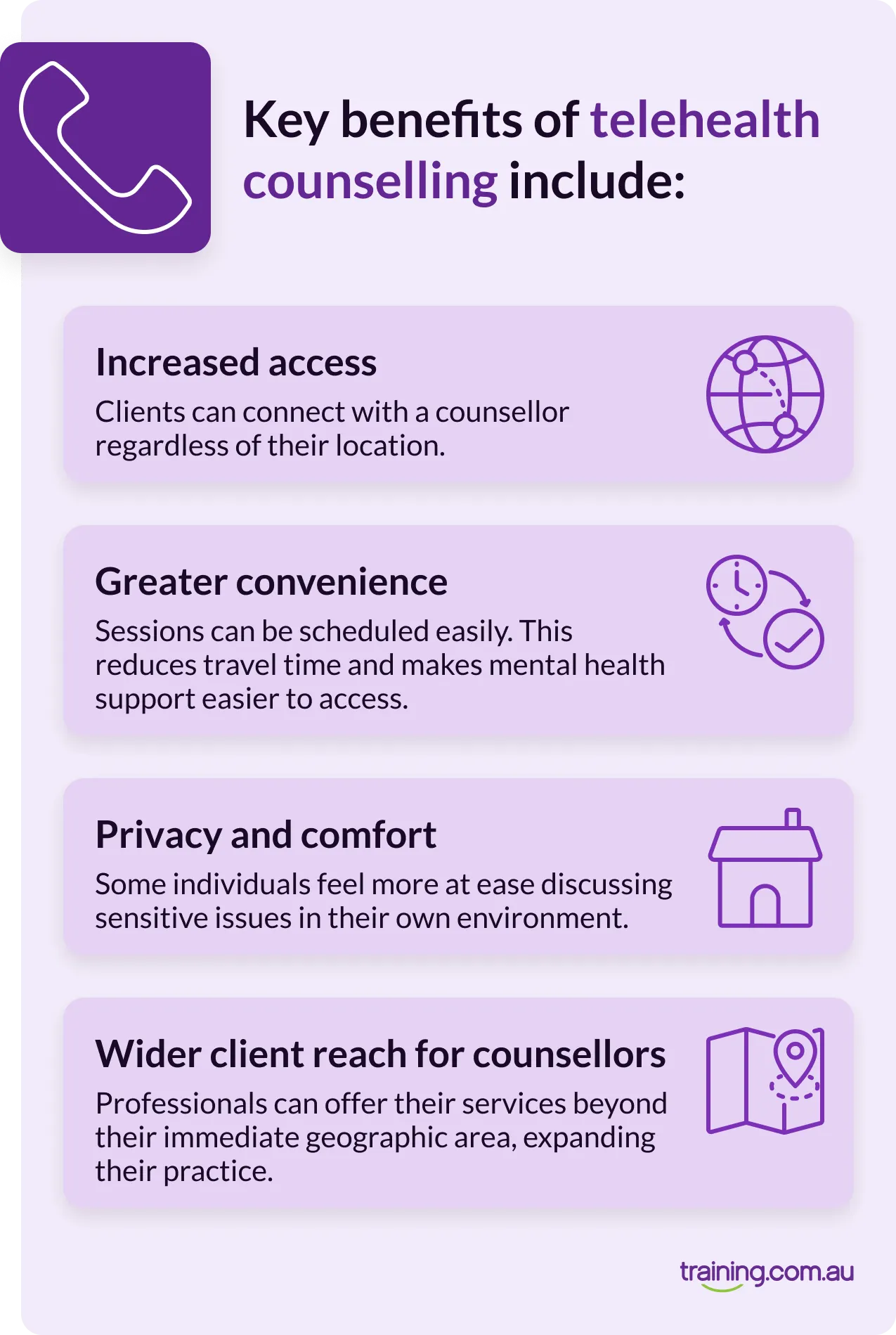The Future of Counselling Jobs in Australia

Thinking about a career in counselling? You might wonder—is it a good career choice right now? Will it still be in demand in 5 or 10 years? Don’t worry, we’ve got the answers for you.
In this article, we’ll dive into why counselling is more important than ever in Australia, how the profession is evolving, and what the future looks like with new technologies shaping how counsellors work.
Counselling job outlook in Australia
Is there a demand for counsellors in Australia?
The need for counsellors in Australia is still high. This is true even though it has dropped since the peak in 2020-21. People are using psychological services more than they did before COVID-19. Almost half of all Australians will experience a mental disorder in their lifetime, indicating a persistent demand for counselling services.
The prevalence of mental illness in Australia has significantly contributed to the ongoing demand for counselling services. Before the pandemic, the Better Access initiative saw a consistent annual increase of 4.7% in psychological services over a decade, indicating a long-term upward trend.
However, this continued demand has led to concerns about unmet needs. This is especially true in rural and remote regions where service provider shortages are more pronounced. Demand for counsellors exists all across Australia, with most work in New South Wales, Queensland, and Victoria. Therefore, pursuing a counselling course positions you to meet this growing demand and unlock exciting career opportunities.
What is the job growth in Australia?
Global Health Education Australia says the need for counsellors will grow by 14.2%, creating 3,500 new jobs by 2026.
Several factors are driving this growth:
Increased focus on mental health care
More organisations recognise the need for mental health support. This has led to higher demand for counsellors in schools, workplaces, and healthcare settings.
Government funding for mental health services
More job opportunities for counsellors have been created because of increased government funding.
Ageing population
As Australia’s population ages, there is a growing need for counsellors specialising in geriatric mental health, grief counselling, and aged care support.
Diverse career pathways
Counselling offers a wide range of career options, including private practice, community services, rehabilitation centres, and telehealth counselling platforms.
Integration of employee assistance programs
Many organisations are incorporating EAPS to support employee wellbeing, creating more opportunities for counsellors.
Employment sectors
Nearly half (44.6%) of counsellors work for an employer, including within the social services, health, and education sectors
With such strong growth projections and a high demand for mental health professionals, becoming a counsellor in Australia is a career path with excellent long-term prospects
The shift in Australian mental health counselling
Different types of counselling and mental health careers exist in Australia. Since emerging as a recognised form of talk therapy in the 1970s, the industry has shifted significantly, largely due to the impact of technology on counselling.
Cognitive behaviour therapy (CBT) has become an essential method within the evolving landscape of mental health, helping clients reflect on their thoughts and feelings to address maladaptive behaviours.
Technology also makes counselling more accessible, allowing future counsellors to offer their support services anytime, anywhere.
With online tools, counsellors can stay up to date with the latest research, professional development and treatment methods, helping them provide better support. They can also collaborate with other professionals to improve care and make well-informed decisions.
Technology is therefore helping create a more flexible and effective counselling experience for both clients and counsellors.
Social media, social norms, and their effect on industry growth
Mental health challenges remain prevalent in Australia. According to the Australian Bureau of Statistics, 42.9% of Australians aged 16–85 have experienced a mental health condition at some point in their lives, with 21.5% reporting a mental disorder in the past 12 months. Anxiety disorders are the most common, affecting 17.2% of this age group.
Discussions around mental health have also become more open in recent years because of the influence of social media platforms. User-generated content on platforms like Instagram, Twitter, TikTok, and Facebook encourages shared personal experiences, which can humanise mental health issues and reduce stigma. This openness has reduced the stigma around mental health and encouraged others to seek help when needed.
However, the relationship between social media use and mental health is complex. While some studies suggest that social media can increase awareness and decrease stigma, others indicate potential negative impacts, such as increased anxiety and depression, particularly among young people.
The rise in telehealth counselling
Telehealth counselling has transformed the delivery of mental health services in Australia. The ability to provide counselling through video calls, phone sessions, and online messaging platforms has made mental health support more accessible than ever before.
Telehealth has been immensely helpful for people living in remote or rural areas. In these places, people can find limited access to in-person counselling services. It has also given clients more flexibility. This is helpful for those with busy schedules and people who like to receive therapy from home.
According to the Australian Institute of Health and Welfare (AIHW), telehealth mental health consultations have increased dramatically since 2020. Millions of Australians can now access counselling services online. The Australian Government’s Better Access scheme has also expanded funding for telehealth services, further driving adoption.
As technology continues to evolve, online counselling will remain a crucial component of Australia’s mental health system. Therefore, future counsellors need to develop strong digital communication skills. They also need to become familiar with online therapy tools. This will help meet the rising demand for virtual mental health support.

5 counselling skills you might already have
Discover 5 counselling skills you may already use in everyday life — and how they can help you succeed in a counselling career.
Emerging trends and technologies in counselling
The counselling profession is constantly evolving, and emerging trends and technologies are transforming the way counsellors work with clients. In this section, we will explore some of the latest developments in counselling and how they are shaping the future of the profession.
AI as a Support Tool
Artificial intelligence (AI) is revolutionising the field of mental health counselling by providing innovative support tools for both therapists and clients. AI-powered chatbots, for instance, offer immediate mental health support and guidance, making it easier for individuals to access help when they need it most. These chatbots can handle initial client interactions, provide coping strategies, and even assist in crisis situations, ensuring that clients receive timely support.
AI tools can provide preliminary mental health screening and support to clients but require human interaction for in-depth therapy. Human counsellors are essential for forming genuine emotional connections that AI cannot replicate. Therefore, AI-powered tools help with mental health care but cannot replace the emotional support of human counsellors.
However, AI in counselling raises concerns about privacy and confidentiality compared to human counsellors. As AI continues to advance, its role in mental health services is expected to grow, offering new ways to enhance client care and improve outcomes.
Data-driven insights
In the realm of mental health counselling, data-driven insights are becoming increasingly crucial. By leveraging data from client sessions, therapists can gain a deeper understanding of their clients’ needs and challenges. This information allows the development of targeted interventions that address specific issues, such as anxiety, depression, or relationship problems.
Data-driven insights also play a vital role in evaluating the effectiveness of treatment plans. By continuously monitoring and analysing client progress, therapists can make informed adjustments to their approaches, ensuring that clients receive the most effective care possible.
This evidence-based practice not only enhances the quality of mental health support but also builds trust between clients and mental health professionals.
Enhancing accessibility
Emerging technologies are making mental health services more accessible than ever before. Online therapy platforms and mobile apps are breaking down barriers to access, allowing clients to receive therapy from the comfort of their own homes. This is particularly beneficial for individuals living in remote or rural areas, where access to in-person counselling services may be limited.
Telehealth services, which include video conferencing and online messaging, have also gained popularity. These services offer flexibility for clients with busy schedules or those who prefer the convenience of virtual sessions. As technology continues to evolve, the accessibility of mental health support is expected to improve, ensuring that more people can receive the help they need.
Specialisations and opportunities in counselling
Counselling is a diverse profession, offering a wide range of specialisations and opportunities for mental health professionals. In this section, we will explore some of the different specialisations and the unique opportunities they present.
A wide range of specialisations
Counselling encompasses various specialisations, each addressing different aspects of mental health and well-being. Here are some common specialisations within the field:
Mental health counselling
Mental health counsellors work with clients experiencing mental health issues such as anxiety, depression, and trauma. They provide support, coping strategies, and therapeutic interventions to help clients manage their symptoms and improve their well-being.
Relationship counselling
Relationship counsellors focus on helping couples and families improve communication and resolve conflicts. They work with clients to strengthen their relationships, address issues such as infidelity or communication breakdowns, and foster healthier dynamics.
Substance abuse counselling
Substance abuse counsellors assist clients struggling with addiction and substance abuse. They provide support, education, and treatment plans to help clients overcome their dependencies and achieve long-term recovery.
Career counselling
Career counsellors help clients explore career options, set career goals, and develop strategies for achieving those goals. They provide guidance on job searching, resume building, and career development, helping clients navigate their professional journeys.
Grief and trauma counselling
Grief and trauma counsellors work with clients who have experienced significant loss or trauma. They provide a safe space for clients to process their emotions, develop coping mechanisms, and work towards healing and recovery.
By pursuing a career in counselling, you can choose a specialisation that aligns with your interests and passions and make a positive difference in the lives of those you support. Whether you are drawn to mental health counselling, relationship counselling, or any other specialisation, the opportunities are vast and rewarding.

5 types of counselling jobs
Explore five popular types of counselling jobs in Australia and find out which counselling career path aligns with your strengths, interests, and goals.
So what does the future look like for the counselling profession?
Nathan Bell’s paper for the Psychotherapy and Counselling Journal of Australia predicts that by 2030:
- The counselling profession will achieve greater recognition and integration within the healthcare sector.
- Greater inclusion will exist in government-funded mental health programs.
- A stronger professional identity, protected titles, and standardised training requirements will ensure consistency in education and practice.
- The growth of professional groups like the Australian Counselling Association (ACA) and Psychotherapy and Counselling Federation of Australia (PACFA) will help set ethical standards.
Additionally, experts expect the rise of telehealth services and digital mental health platforms to enhance the accessibility of counselling, particularly in remote areas.

Future-proof your career with counselling
The demand for counsellors in Australia is growing. If you’re ready to take the next step, don’t miss our complete breakdown of the profession.
Ready to start your counselling career?
As mental health awareness continues to grow, the demand for qualified counsellors is stronger than ever. Whether you’re passionate about helping individuals navigate life’s challenges, fostering personal growth, or specialising in areas like trauma, addiction, or family counselling, now is the perfect time to start your journey.
With flexible study options, a wide range of specialisations, and strong career opportunities, a counselling qualification can open the door to a fulfilling and impactful career.
Explore accredited counselling courses today and begin your path to a rewarding profession.


